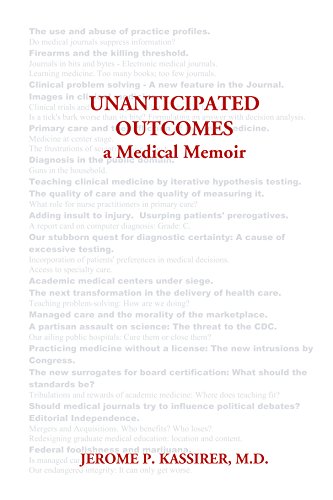 Although Jerome Kassirer is a familiar name to many physicians of a certain age, there is perhaps now a generation of young health professionals who are not acquainted with this remarkable physician, his multiple accomplishments, and incredible integrity. Unanticipated Outcomes is a personal memoir that tracks his fascinating trajectory from modest background to serendipitous medical student to eventually the editorship of the New England Journal of Medicine (NEJM), and his later career following his dismissal from said journal.
Although Jerome Kassirer is a familiar name to many physicians of a certain age, there is perhaps now a generation of young health professionals who are not acquainted with this remarkable physician, his multiple accomplishments, and incredible integrity. Unanticipated Outcomes is a personal memoir that tracks his fascinating trajectory from modest background to serendipitous medical student to eventually the editorship of the New England Journal of Medicine (NEJM), and his later career following his dismissal from said journal.
Given that Dr Kassirer began medical school in 1953, assumed the esteemed NEJM editorship in 1991, and was ousted from the position in 1999, you could ask what is the pertinence of this memoir in 2017? Yet the rise of “fake news” and the disintegration of ethics among many academic physicians—and even at the highest echelons of the world’s most mighty democracy (see, for instance, the conflicts of interest of the current US secretary of health and human services, not to mention those of his boss)—make Kassirer’s medical memoir a still relevant and compelling read. Plus ça change, plus c’est pareil.
Kassirer’s personal memoir underscores everything that is right about academic medicine. There is the telling story of the patient followed for over 30 years—Kassirer’s caring and understanding relationship with this patient poignantly jumps off the page, and demonstrates both his commitment to and respect for the basic tenets of medicine.
Simultaneously, there is his chronicle of his development as an independent researcher seeking to go beyond his substantive specialty of nephrology into critical thinking and decision analysis. It is worth recalling the humble beginnings of quantitative decision making, and remembering that patient care has always been central to clinical decision making and we need to keep it paramount in this modern era of artificial intelligence, big data, and advanced neural networks.
 Kassirer describes in detail how his clinical, teaching, and research profiles, accompanied by previous editorial experience, abetted by his local connection to Boston, and perhaps his understated approach to the position, saw him vaulted from an underdog candidate to the top dog as editor of the NEJM. Kassirer’s love and passion for this job is palpable as he seeks to protect and enhance the journal’s “sacred” mission of advancing the research into and the practice of clinical medicine. During his leadership, the NEJM moved into the internet era and introduced several new pedagogical features including “Clinical Problem Solving,” “Images in Clinical Medicine,” Molecular Medicine,” and “Clinical Implications of Basic Research.”
Kassirer describes in detail how his clinical, teaching, and research profiles, accompanied by previous editorial experience, abetted by his local connection to Boston, and perhaps his understated approach to the position, saw him vaulted from an underdog candidate to the top dog as editor of the NEJM. Kassirer’s love and passion for this job is palpable as he seeks to protect and enhance the journal’s “sacred” mission of advancing the research into and the practice of clinical medicine. During his leadership, the NEJM moved into the internet era and introduced several new pedagogical features including “Clinical Problem Solving,” “Images in Clinical Medicine,” Molecular Medicine,” and “Clinical Implications of Basic Research.”
In a chapter titled “Exploiting the Bully Pulpit,” Kassirer reviews several of his editorials that stamp his imprimatur on contemporary medicine. Chief among these is his concern for doctors’ financial conflicts of interest, which threaten and, ultimately, denigrate the medical profession. Other provocative editorials that he penned and which he discusses here include gun violence and the need for gun control, resident education, board certification standards, and medical marijuana. In all of these topics, he espoused well argued, cogent, liberal viewpoints of problems that still confront us today.
Ultimately, the battle over financial conflicts of interest went from a global to a local issue, with the NEJM owners advocating that the journal should be more profit orientated, which clashed sharply with Kassirer’s viewpoint that the journal’s quality and integrity would be compromised by such actions. The supporting rationale for these opposing arguments, as well as “other bones of contention,” is well described. While Kassirer initially attributed his firing uniquely to this headbutting over the commercial aspects of the NEJM, he later acknowledges that his liberal philosophy—which often ran counter to the prevailing attitudes of the leading professional societies—perhaps also played a significant part.
Young physicians in need of a historical appreciation of the profession and its contemporary debates should find the book refreshing and relevant. In recent years, the commercialisation of academic medicine has only grown and become more pervasive. Doctors now boast of their numerous industry ties as consultants, as key opinion leaders, on speakers’ bureaus, and as recipients of industry funding. On a playful level, these doctors proclaim “I’m in bed with everyone, so no one is favoured.” More seriously, these academic “leaders” audaciously claim that via the sanctity of transparency, and by declaring their conflicts of interest, their industry interactions hold no influence on their decision making or proclamations as guideline writers.
Unfortunately, while such declarations are necessary, they are by no means sufficient to control conflicts of interest—a fact well appreciated by Kassirer. In this context, it is incredibly refreshing to read Kassirer’s memoir, where personal integrity remains meaningful and—in contrast to many current academic leaders—inspiring as an ideal that we should aspire to in our professional lives. Failure to recognise and follow these ideals will undoubtedly lead to outcomes that are not at all unanticipated, but rather all too predictable.
James Brophy is a professor in the Departments of Medicine and Epidemiology and Biostatistics at McGill University, and is a staff cardiologist at the McGill University Health Centre.
Competing interests: I have read and understood BMJ policy on declaration of interests and declare the following interests: None.
